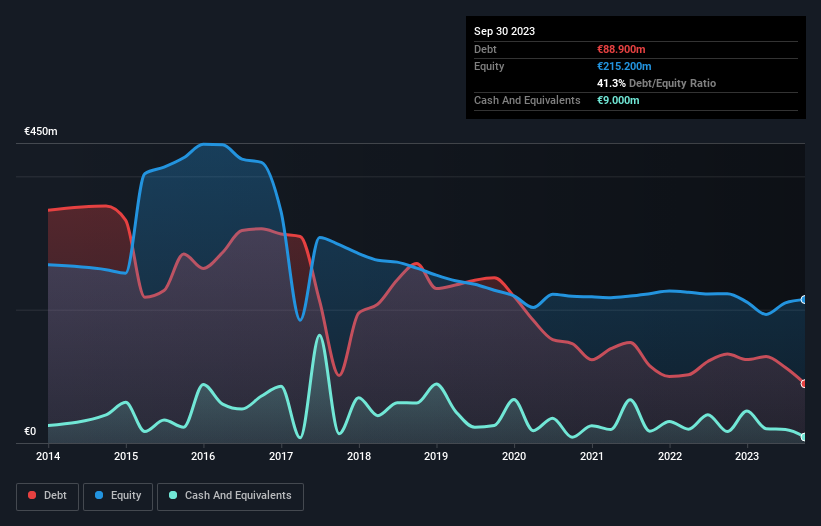
Warren Buffett famously said, 'Volatility is far from synonymous with risk.' So it might be obvious that you need to consider debt, when you think about how risky any given stock is, because too much debt can sink a company. We note that Eltel AB (publ) (STO:ELTEL) does have debt on its balance sheet. But is this debt a concern to shareholders?
When Is Debt Dangerous?
Generally speaking, debt only becomes a real problem when a company can't easily pay it off, either by raising capital or with its own cash flow. Part and parcel of capitalism is the process of 'creative destruction' where failed businesses are mercilessly liquidated by their bankers. However, a more common (but still painful) scenario is that it has to raise new equity capital at a low price, thus permanently diluting shareholders. Of course, plenty of companies use debt to fund growth, without any negative consequences. The first step when considering a company's debt levels is to consider its cash and debt together.
View our latest analysis for Eltel
What Is Eltel's Net Debt?
The image below, which you can click on for greater detail, shows that Eltel had debt of €88.9m at the end of September 2023, a reduction from €133.4m over a year. However, because it has a cash reserve of €9.00m, its net debt is less, at about €79.9m.

How Strong Is Eltel's Balance Sheet?
Zooming in on the latest balance sheet data, we can see that Eltel had liabilities of €322.3m due within 12 months and liabilities of €85.3m due beyond that. Offsetting this, it had €9.00m in cash and €204.9m in receivables that were due within 12 months. So it has liabilities totalling €193.7m more than its cash and near-term receivables, combined.
The deficiency here weighs heavily on the €102.8m company itself, as if a child were struggling under the weight of an enormous back-pack full of books, his sports gear, and a trumpet. So we definitely think shareholders need to watch this one closely. After all, Eltel would likely require a major re-capitalisation if it had to pay its creditors today. There's no doubt that we learn most about debt from the balance sheet. But it is future earnings, more than anything, that will determine Eltel's ability to maintain a healthy balance sheet going forward. So if you want to see what the professionals think, you might find this free report on analyst profit forecasts to be interesting.
In the last year Eltel's revenue was pretty flat, and it made a negative EBIT. While that hardly impresses, its not too bad either.
Caveat Emptor
Importantly, Eltel had an earnings before interest and tax (EBIT) loss over the last year. Its EBIT loss was a whopping €13m. When we look at that alongside the significant liabilities, we're not particularly confident about the company. We'd want to see some strong near-term improvements before getting too interested in the stock. For example, we would not want to see a repeat of last year's loss of €27m. And until that time we think this is a risky stock. For riskier companies like Eltel I always like to keep an eye on whether insiders are buying or selling. So click here if you want to find out for yourself.
At the end of the day, it's often better to focus on companies that are free from net debt. You can access our special list of such companies (all with a track record of profit growth). It's free.
If you're looking to trade Eltel, open an account with the lowest-cost platform trusted by professionals, Interactive Brokers.
With clients in over 200 countries and territories, and access to 160 markets, IBKR lets you trade stocks, options, futures, forex, bonds and funds from a single integrated account.
Enjoy no hidden fees, no account minimums, and FX conversion rates as low as 0.03%, far better than what most brokers offer.
Sponsored ContentValuation is complex, but we're here to simplify it.
Discover if Eltel might be undervalued or overvalued with our detailed analysis, featuring fair value estimates, potential risks, dividends, insider trades, and its financial condition.
Access Free AnalysisHave feedback on this article? Concerned about the content? Get in touch with us directly. Alternatively, email editorial-team (at) simplywallst.com.
This article by Simply Wall St is general in nature. We provide commentary based on historical data and analyst forecasts only using an unbiased methodology and our articles are not intended to be financial advice. It does not constitute a recommendation to buy or sell any stock, and does not take account of your objectives, or your financial situation. We aim to bring you long-term focused analysis driven by fundamental data. Note that our analysis may not factor in the latest price-sensitive company announcements or qualitative material. Simply Wall St has no position in any stocks mentioned.
About OM:ELTEL
Eltel
Operates as an infrastructure and service provider for critical communication and power networks in Finland, Sweden, Norway, Denmark, Lithuania, Germany, and internationally.
Undervalued with excellent balance sheet.
Similar Companies
Market Insights
Community Narratives




